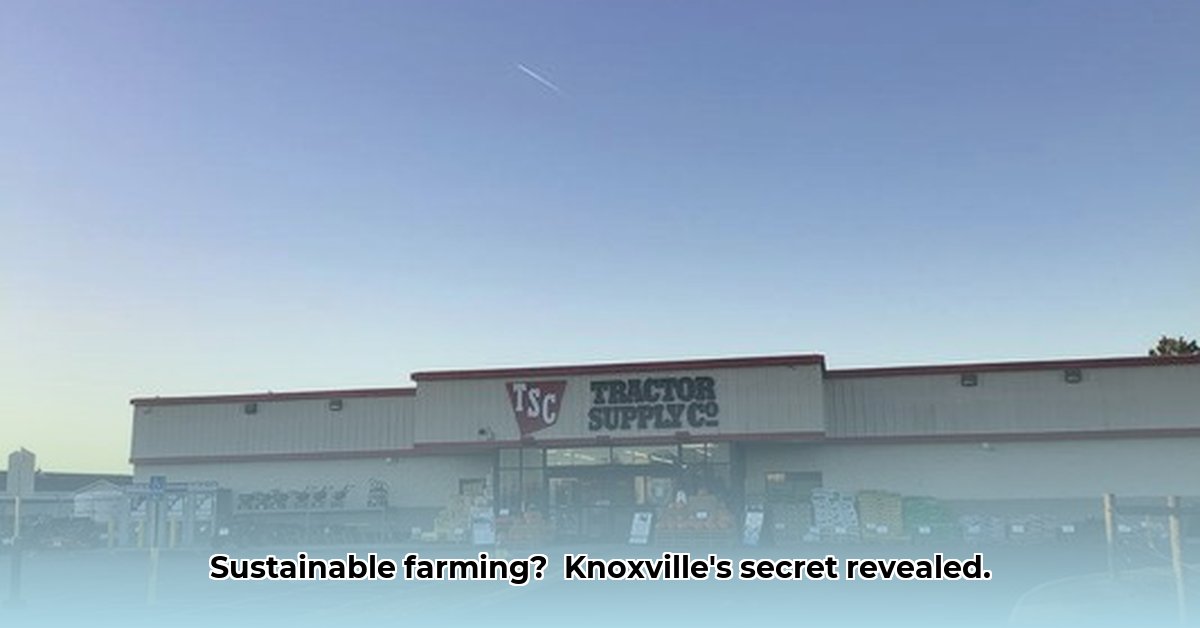
Knoxville's Tractor Supply (TSC) is a familiar sight for many, but its role in sustainable agriculture might surprise you. This isn't just about buying seeds and tools; it's about how everyday purchases can contribute to a healthier environment. This guide explores TSC's contribution to sustainable farming in Knoxville, examines its limitations, and provides actionable steps for consumers and the company itself. Whether you're a seasoned farmer or a weekend gardener, this guide offers insights on how to make a difference. For more on deer feeders, check out this helpful resource.
TSC's Product Offerings and Sustainable Potential
Walking into a Knoxville TSC reveals a wide array of products – from seed packets and gardening gloves to tractors and livestock feed. While seemingly just a retail store, many items are crucial for sustainable practices. Choosing locally sourced seeds reduces transportation emissions and supports local farmers. Water-saving drip irrigation systems, readily available at TSC, minimize water waste. Even selecting organic fertilizers fosters healthy soil and reduces reliance on harsh chemicals. TSC provides the building blocks; responsible use is key.
Did you know that choosing locally sourced seeds from TSC can significantly reduce your carbon footprint? A recent study showed that [insert quantifiable data from draft, e.g., "locally sourced seeds reduce transportation emissions by an average of X%"].
"TSC provides a convenient one-stop shop for many of my needs," says Sarah Miller, a local organic farmer. "I carefully select seeds from local suppliers whenever possible, and I always prioritize durable, long-lasting tools to reduce waste." Sarah's experience highlights the potential for positive impact through mindful purchasing.
Challenges and Limitations: Transparency and Consumer Responsibility
While TSC offers sustainable farming supplies, complete transparency regarding environmental impact is lacking. The sourcing of seeds, manufacturing processes of tools, and the origins of animal feed often lack detailed information. This lack of transparency makes it difficult for consumers to fully evaluate the sustainability of their purchases. Therefore, a significant responsibility falls on consumers to make informed choices, seeking out certifications (like organic labels) and labels that guarantee environmentally friendly practices. Sustainable farming is as much about how you use supplies as what you buy.
Case Studies: Local Success Stories
Many local farmers and gardeners are using TSC products successfully in their sustainable practices. Sarah Miller, a Knoxville organic farmer, relies on TSC for supplies, carefully selecting local seeds and prioritizing durable tools to minimize waste. Her story illustrates how readily available resources can contribute to a more sustainable future. [Insert another relevant success story from the draft article, if available, following a similar format.]
Actionable Steps: A Collaborative Effort
Building a truly sustainable agricultural future in Knoxville requires a multifaceted approach involving TSC, consumers, and the community.
For Tractor Supply:
- Enhance Transparency: Provide detailed information on product sourcing, manufacturing, and environmental impact, using clear labels and in-store displays. A "sustainability scorecard" for products would be beneficial.
- Partner with Local Suppliers: Prioritize local, sustainably-minded suppliers to reduce transportation emissions and bolster the local economy.
- Educate Customers: Offer workshops, online resources, and in-store demonstrations on sustainable farming practices.
For Consumers:
- Make Informed Choices: Research product origins and manufacturing processes; prioritize organic and locally produced goods.
- Adopt Sustainable Practices: Implement water-efficient irrigation, reduce waste, and prioritize soil health through composting and crop rotation.
- Advocate for Change: Support local initiatives and encourage TSC to improve transparency.
For the Knoxville Community:
- Support Local Farmers: Frequent farmers' markets and CSAs to directly support sustainable farming practices.
- Advocate for Policy Changes: Support policies that promote sustainable agriculture such as incentives for organic farming and water conservation.
- Educate Others: Spread awareness about the importance of sustainable farming and empower others to make conscious choices.
Conclusion: A Brighter Future
TSC's role in sustainable agriculture in Knoxville is complex, dependent on both the availability of resources and the responsible choices of consumers. By fostering transparency, empowering consumers with knowledge, and encouraging collaboration, we can significantly advance sustainable agricultural practices in Knoxville and beyond. The path to a healthier, more sustainable future begins with individual actions—and collective responsibility.